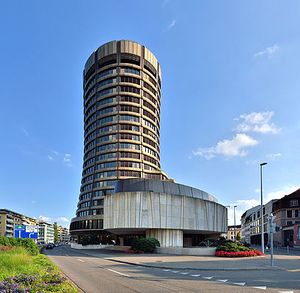Difference between revisions of "BIS"
(image) |
|||
| Line 4: | Line 4: | ||
|constitutes=deep state milieu, central bank, nation state | |constitutes=deep state milieu, central bank, nation state | ||
|logo=BIS-logo.PNG | |logo=BIS-logo.PNG | ||
| + | |image=Bank for International Settlements.jpg | ||
|titular_logo=1 | |titular_logo=1 | ||
|abbreviation=BIS | |abbreviation=BIS | ||
Revision as of 19:13, 17 December 2019
(Deep state milieu, Central bank, Nation state) | |
|---|---|
 | |
| Formation | 17 May 1930 |
| Leaders | • BIS/General Manager • BIS/Chairman |
| Type | |
| Interest of | Edward Jay Epstein, Adam LeBor |
| Subpage | •BIS/Assistant General Manager •BIS/Chairman •BIS/General Manager •BIS/President |
| The central bankers' central bank - nothing to see here. | |
The Bank for International Settlements (BIS) is a secretive group of the world's central bankers, based in Basel. It is not generally regarded as a nation state (generally regarded as being in Switzerland), but is listed here as such since its has a unique legal status which makes the place inviolable.[1]
Contents
Official narrative
The BIS is more or less off the agenda of commercially-controlled media.
“The Bank is completely removed from any governmental or political control.”
Gates McGarrah (march 1931) A Balance Wheel of World Credit [2]
The first president of the Bank for International Settlements
Other opinions
Adam Lebor has written a book critical of this group.[1] As a secretive group at the apex of the global system of fiat currency, the group is categorised here as a deep state milieu. In the absence of leaks, its exact activities remain a subject of speculation.
Legal status
The bank has a unique legal status. This was clarified in 1987 under a legal agreement between the Swiss Federal Council and the BIS and gave the bank "inviolability", defined as follows:
“1. The buildings or parts of buildings and surrounding land which, whoever may be the owner thereof, are used for the purposes of the Bank shall be inviolable. No agent of the Swiss public authorities may enter therein without the express consent of the Bank. Only the President, 2 the General Manager of the Bank, or their duly authorised representative shall be competent to waive such inviolability.
2. The archives of the Bank and, in general, all documents and any data media belonging to the Bank or in its possession, shall be inviolable at all times and in all places.
3. The Bank shall exercise supervision of and police power over its premises.”
(1987) [3]
Related Quotation
| Page | Quote | Date |
|---|---|---|
| IGO | “Well after Argentina went bust in 1991 it offered most of its creditors about thirty-five cents on the dollar. About ninety percent of these people accepted that but some of them didn't and they tried to sue the bank In Switzerland because that's where its headquarters, but the Swiss courts and I think also the Swiss Federal Council have said that the bank is founded by an international treaty. It is inviolable: it cannot be sued.” | 2018 |
Group
| Group | Start |
|---|---|
| Basel Committee on Banking Supervision | 1974 |
Employee on Wikispooks
| Employee | Job | Appointed | End |
|---|---|---|---|
| Alexandre Lamfalussy | Economic adviser | 1976 | 1981 |
Related Document
| Title | Type | Publication date | Author(s) | Description |
|---|---|---|---|---|
| Document:Masters of metal | article | 30 July 2015 | Rusticus | A startling and ominous analysis of progress towards an impending New world Order |
References
- ↑ a b http://www.unwelcomeguests.net/739
- ↑ Nation’s Business, March 1931, 24. BIS archive, File 7.18 (2), MCG8/55
- ↑ Agreement between the Swiss Federal Council and the Bank for International Settlements to determine the Bank’s legal status in Switzerland